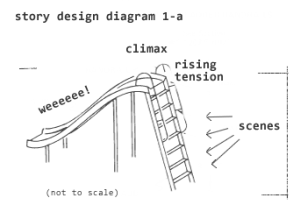Patrick Wayland's Blog, page 3
August 7, 2014
Spending on Vending

Private Vending Machine in Naha, Okinawa
No matter how advanced your country, it will never have as many vending machines as Japan.


August 5, 2014
to adverb or not to adverb
Everyone hates adverbs. To many they are like cockroaches. Stomp them, stomp them, where ever they appear! They are a waste of space, of words, of time, of brain cells. Disgusting! They tell when things should be shown: “I’m mad,” she said angrily. And I used to always scratch them out with my red pen when critiquing my fellow writers’ works. But over time I’ve started to bend the golden rules of our forefathers – Strunk & White – and allow for some adverbs. Why? Because like anything there are places for them.
Let’s look at one writer who uses them often. Her name is J.K.Rowlings. You might have heard of her. She was mildly successful in her relatively popular series. Did her use of adverbs cause her downfall? (Hint: she was the 12th richest woman in Great Britain in 2008)
“Careful not to walk through anyone,” said Ron nervously.
The Harry Potter series is YA (young adult), and I think this has to be taken into consideration. Adverbs can add flare that keeps younger readers hanging on the edge of every sentence. As we get older, we stop eating gobs of candy. Could it be the same with adverbs? Also, adverbs can be used for adding humor and they can simplify long descriptions.
He quickly locked the door.
That wasn’t so bad; in fact, it adds something. I feel a bit of tension. Tension is good.
So, for adverbs, I say:
1. Respect your audience. Yes, they might be superfluous, but for younger readers they might just be colorful.
2. Look at the whole sentence. Consider if the adverb is adding to the scene/feeling.


August 4, 2014
Don’t forget the old books!
I love walking through used books stores and libraries. I can waste hours looking through the most esoteric stuff, unknown histories, long-forgotten pulp, antiquated magazine articles… If you’re a book explorer like me, I recommend checking out manybooks.net.
They have been propagating Project Gutenberg’s work for a few years, along with some extra services like reader reviews and a large variety of file formats (yes Kindle!). I challenge you to find a book without a review and be the first to talk about it. You’ll find an ocean of reading there from Joseph Conrad stories to early writings of conservationalism.


August 2, 2014
Bali Seaweed

Seaweed harvesting in Bali.
Seaweed is a fantastically nutritious as well as delicious. It’s a source of vitamins A and C, calcium and iodine.


August 1, 2014
Immediacy
What am I saying about “Immediacy” right now? I’m saying it is fundamentally important as I pound my fist down on the table.
What is Immediacy? It can be a difficult to define, but it’s like grass in your lawn. You don’t think about it that much until it dries up and dies, and your pet pooch rolls around on a patch of dirt, and then he tracks that into the house, and then you have to clean it up. Immediacy is keeping out things that add tedium. Flat description, passive verbs, inert sentences. If the sentence is not happening, then you might consider revising.
Here’s an example in my story I just revised:
Old and busted:
Her mother walked into the dining room, carrying a pan of wings and drumsticks covered in barbecue sauce. Edward could smell the allspice in it.
New hotness:
Her mother walked into the dining room, carrying a pan of wings and drumsticks coated with barbecue sauce. When she set the pan down on the table, Edward leaned over and sniffed in the allspice.
“could smell” is so vague. Is it an ability or is it happening? No one knows. Words like could, would , was (or Present tense version) are flags that might signal less Immediacy.


July 31, 2014
Do you give readers what they want?
Are you giving your readers what they want? And I’m not talking about remote control of the protagonist or yelling, “Don’t go in there!” as the next horror victim walks into a dark room where the ax murderer is hiding. I’m talking about answering questions that come up as the story moves along. Too many times, the writer is in visual mode and sees the story-movie running along in their head, but forgets to put some details down on the page to convey that scene or thoughts to the reader.
But how can I be sure I am giving readers what they want?
beta readers
This is one of the reasons beta readers (writing group, reading friends) are invaluable. If you find people who are willing to read your early stuff, hold onto them like gold and bribe them with cake and cookies . (Or pay an editor a whole lotta money)
And what should you, as the writer, do after your beta reader has read your work and is talking about it? You should keep your mouth shut and write down what they say. Write down all feedback. Later – only later – should you gauge if the input is useful or should be ignored. After your beta reader gives you input, you should say these 2 words: Thank you. Never, ever, ever, EVER argue. Why? Because, first of all, it is all opinion since creative writing is an art like painting or sculpting or pickle juggling (Hey, don’t judge!). Second, when you argue, you might be pushing away your valuable beta reader (see above).


July 28, 2014
I saw them fighting
Here’s another writing habit I see a lot in our critique group – even in my own stuff (hopefully only in the first draft). Take out the distancing terms like “I see”, “she heard”, “he smells”, “they felt”…
As a writer you want to be conscious of the image you are putting in the readers head. Which one of these is stronger?
a.) Daisy saw Bo and Luke duking it out.
b.) Bo took a swing at Luke.

Unless you want the focus on Daisy of course, but then she better be showing some strong emotions and not just seeing because that’s a waste. The reader is already seeing things.


July 26, 2014
Bali

A young surfer takes a break from the waves on Dream Beach, Nusa Lembongan Island
Bali is well-developed with hotels for any budget, great restaurants, fantastic weather and lots of beaches. But the blessing is also the curse as traffic is like a waiting line at popular Disney World rides. It took 40 minutes or more to get anywhere. The small satellite islands were less crowded and let us get closer to nature.


July 23, 2014
Read Your Writing Like A Reader
I love my Kindle so much that Pee-wee Herman would tell me to marry it.

Not only is it good for ordering books, you can also read books that are not from Amazon — if you don’t know this already. It’s also very useful for checking over revisions. Simply send your MS Word document to your Kindle email. The file will automatically be downloaded. Kindle formats the file and lets you read it like any other book.
Try it! After you have finished that first/second/third draft, change your MS Word manuscript’s double-spaced lines to single-spaced. Save the file under a different name (always protect your original). Now, send your MS Word document, as an attachment, to your Kindle account. Kindle has the fantastic ability to display many types of documents. You can find your Kindle’s email on your Kindle manager account page on Amazon. You’ll need to setup your Kindle account to allow emails from your own personal email address because Kindle blocks incoming emails, except those that you allow.
Next, sit back on the sofa and read your work like you read everything else. Read it as a reader, not a writer. Keep a notebook nearby to write notes about where you’re not feeling the emotion/action/character/scene/etc.. This is not a good way to fix the small mistakes in grammar and spelling, but it is a great way to distance yourself from your writing and spot those places that need more or less description, and getting what emotion the writing is delivering to the reader.


July 22, 2014
Got Act Breaks?
Act Breaks, they’re not just for TV anymore. We all know the structure of a typical story. Rising tension leading up to a climax and then the end (see figure 1-a).
In TV land the structure is often very defined to coincide with “and now a word from our sponsor.” How do they make sure you will return after the commercial? How do they keep you looking around the kitchen doorway at the screen to check that the show isn’t back on? The old TV serious Batman(1966-1968) was ridiculously good at this, actually asking you – the audience – before the break how Batman will escape from being dropped into boiling acid? (And why do you need to boil acid?)
George R.R.Martin, author of the Games of Thrown series,worked as a TV script writer in the 1980s on the Twilight Zone and Beauty and the Beast. You can see this influence in his writing as he keeps readers on edge with scene breaks that are mini climaxes, leaving the hero dangling as he moves from character to character. Tension is what keeps the reader turning pages, and it is vital with modern readers. As a writer, you might ask the question: “can I finish this scene with more tension?” The Act Break climax is a power tool that is definitely not just for TV.






